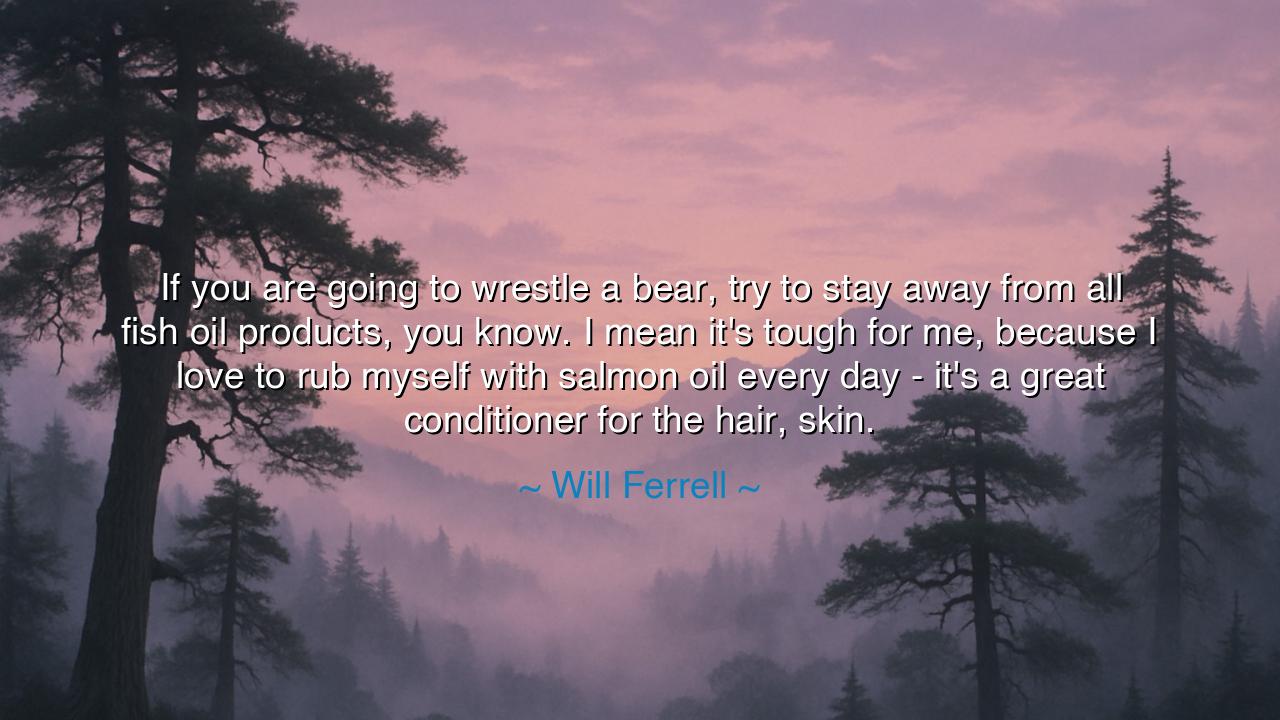
If you are going to wrestle a bear, try to stay away from all
If you are going to wrestle a bear, try to stay away from all fish oil products, you know. I mean it's tough for me, because I love to rub myself with salmon oil every day - it's a great conditioner for the hair, skin.






At first glance, the words of Will Ferrell — “If you are going to wrestle a bear, try to stay away from all fish oil products… I love to rub myself with salmon oil every day — it’s a great conditioner for the hair, skin” — seem born of jest. Yet beneath the cloak of humor lies a wisdom as sharp as an ancient fable. For the bear, in its towering might, is not merely an animal; it is the symbol of life’s great challenges, the adversities that stand before every human soul. And the fish oil, with its tempting scent and soothing nature, is the metaphor for our own self-inflicted weaknesses — the habits, indulgences, or vanities that make us vulnerable when facing struggle. Thus, this jesting saying, like many utterances of the wise fool, conceals a truth: one must not anoint oneself with the very thing that draws danger close.
In every age, the ancients understood that wisdom often hides in laughter. The fool of the court, like Ferrell in the realm of comedy, was free to speak truths that kings feared to hear. When he warns, “stay away from fish oil,” he speaks of the need for preparedness and self-awareness. How often do men, before entering battle with fate, unknowingly make themselves weak — overconfident, distracted by vanity, unguarded by reason? The one who “rubs himself with salmon oil” before wrestling a bear is not unlike the man who enters a test unstudied, or the warrior who rushes into war seeking glory instead of survival. The scent of pride attracts peril as surely as the scent of fish draws the bear.
To wrestle a bear — that is, to face something greater than oneself — requires not only courage but discipline. The bear is life’s raw power, indifferent and immense. Some will seek to charm it; others will run. But the wise prepare. The man who trains his mind and tempers his desires stands a chance; the one who bathes in his own vanity is devoured. Thus, Ferrell’s humor becomes parable: if you must face the impossible, do not make it harder through your own folly.
History itself offers such lessons. Consider Napoleon, the lion of France, whose genius conquered empires but whose hubris lured him into Russia’s frozen maw. Like the man anointed in salmon oil, he walked boldly into the den of the bear — unprepared for the hunger and cold that would consume his army. Or think of Icarus, whose waxen wings — made with beauty, but not prudence — melted before the sun. The world is filled with those who, loving their reflection too deeply, have drawn destruction closer with their own hands.
Yet the humor of Ferrell’s quote reminds us not to despair. For laughter is also a shield against fear. The ability to mock one’s own foolishness is a form of wisdom cloaked in joy. To laugh at our mistakes is to acknowledge them without surrendering to shame. When the ancients spoke of the philosopher Diogenes, living in his barrel and mocking the vanity of kings, they too understood that the jester’s tongue often carries the philosopher’s heart. Will Ferrell, in this spirit, teaches through absurdity what sages once taught through riddles: Know thyself, and prepare thy soul before the struggle.
The lesson is simple yet eternal: before wrestling your own “bear” — whether that be a challenge, an ambition, or a fear — examine your heart for the oils of pride, complacency, or self-deceit. Wash them away with humility. Do not make yourself appetizing to misfortune. The bear is already fierce; do not scent yourself with weakness.
And finally, remember this: humor is not the absence of wisdom but its gentlest form. Laugh at your follies, learn from your absurdities, and approach your battles with a clear spirit. For though the world may often seem a wild forest and life a wrestling match with beasts unseen, the one who walks into it prepared — clean of pride, aware of his own scent — shall emerge not devoured, but victorious, and wiser for the scars.






AAdministratorAdministrator
Welcome, honored guests. Please leave a comment, we will respond soon